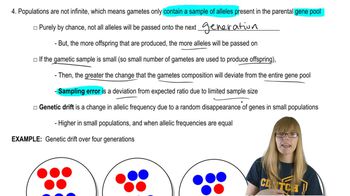Here are the essential concepts you must grasp in order to answer the question correctly.
Random Genetic Drift
Random genetic drift is a mechanism of evolution that refers to random fluctuations in allele frequencies within a population due to chance events. In small populations, these random changes can lead to significant shifts in genetic variation over generations, potentially resulting in the loss of alleles or fixation of certain alleles, regardless of their adaptive value.
Recommended video:
Allele Frequencies
Allele frequencies represent the proportion of different alleles of a gene in a population. They are crucial for understanding genetic diversity and evolution, as changes in these frequencies can indicate how populations evolve over time. In the context of random genetic drift, allele frequencies can change unpredictably, leading to reduced genetic variation.
Recommended video:
New Alleles and Migration
Population Size and Genetic Drift
The size of a population significantly influences the impact of random genetic drift. In smaller populations, the effects of drift are more pronounced, leading to greater fluctuations in allele frequencies. This can result in rapid evolutionary changes, whereas larger populations tend to buffer against such random changes, maintaining more stable allele frequencies over time.
Recommended video:
 Verified step by step guidance
Verified step by step guidance Verified video answer for a similar problem:
Verified video answer for a similar problem:

